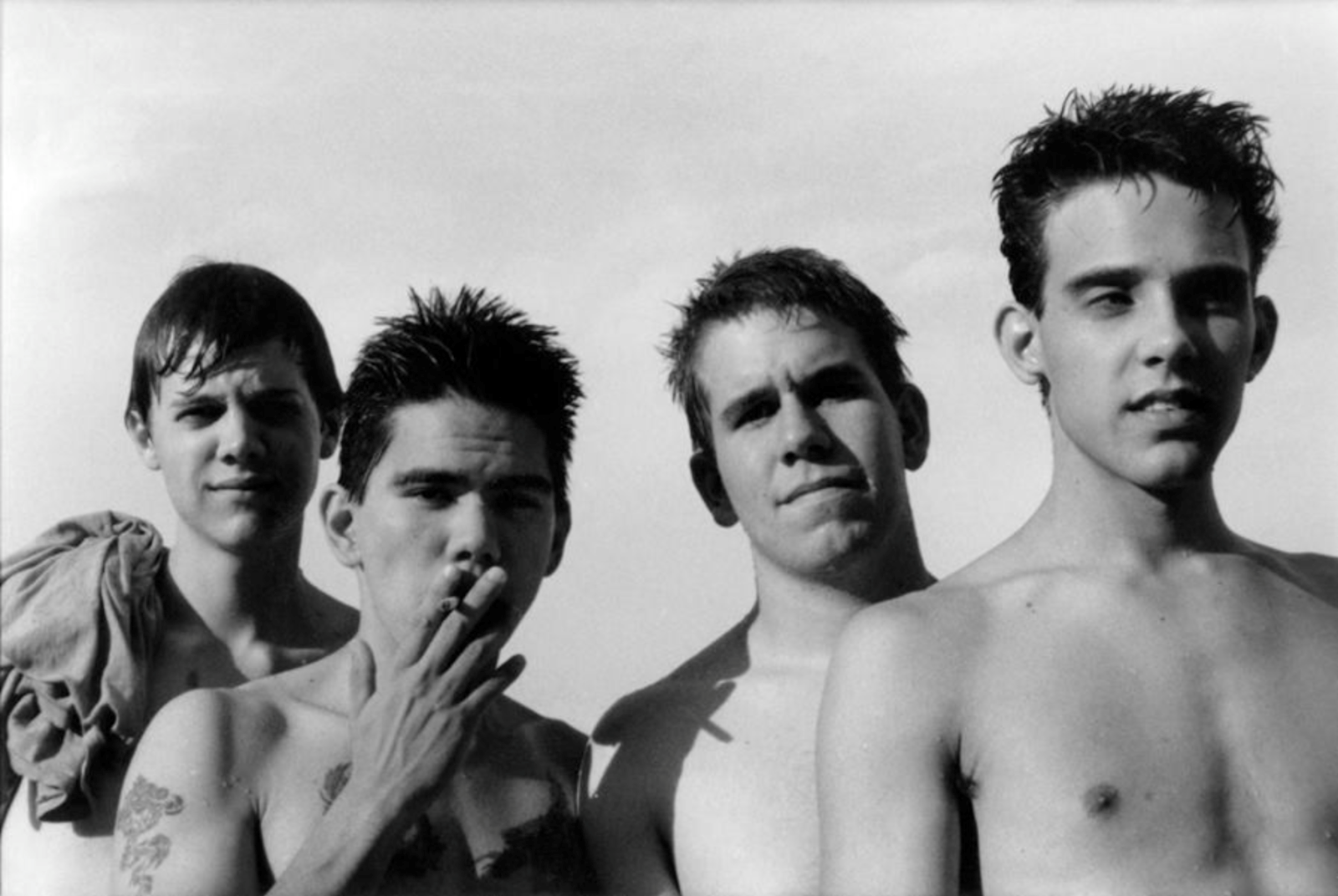BEHIND THE SEAMS: LEVI STRAUSS LOOKS TO LOUISVILLE FOR INSPIRATION
In 2011, the groundwork began coming together for an ambitious project at The University of Louisville to archive Louisville’s underground music culture from the 1970’s to present day. At the helm of the project were people who lived it; zine makers, musicians, photographers, and fans. In 2019, a designer from Levi Strauss’ vintage collection came to Louisville to use the archive to inform his new collection.
Long before landing at the helm of an international denim line, Paul O’Neill was a kid in Dublin, Ireland. Paul started getting into punk music when he was 12, a fairly standard age to start being drawn to basements and small venues filled with loud guitars and the kind of people making that music their way of life. When you get into underground music, you either grow out of it or you get all the way into it. Paul falls into the latter category and by the time he was entering his 20’s, he was fully aware of a short but powerful record from a band of teenagers in Louisville called Slint.
Slint, 1990 by Will Oldham
The Long Legs of Spiderland
Slint’s defining work, Spiderland, was released in 1991 after the band had already broken up. Despite rave reviews from Steve Albini, a recording engineer for bands like Nirvana, Pixies, and Cheap Trick, the record received very little attention or promotion and only sold 5,000 copies. In his review, Albini correctly predicted, “...in 10 years it will be a landmark and you will have to scramble to buy a copy then.”
An ocean away, Paul O’Neill’s fascination with Slint was giving way to interest in exploring more music coming out of Louisville, Ky., and Tim Furnish was finding more reasons to make it. Now an advisor for the Louisville Underground Music Archive, Tim is one of those rare breeds of musician who seems to be able to maintain enough of the affection that first moved him to play music that he’s never really stopped. Tim’s first band, Cerebellum, formed in Louisville in 1988 and he describes the scene at that time as “...a community of show-goers who had a fiendish appreciation for what's happening and what had happened before.”
(L) Tim Furnish for Levi’s, 2019 by Immo Klink
(R) Tim Furnish (center) in Crain, 1991 by Breck Pipes
While Louisville bands shared a kinship with similar underground acts in cities like Chicago and DC, there was something distinct and dissonant coming out of Louisville. Slint is sometimes credited with creating the entire post-rock genre by combining elements of punk rock, heavier slower riffs like those popularized by bands like Black Sabbath, and something guttural and raw that can only come from mourning the passage of youth in real time.
Making What is Old New Again
As a lifelong student of underground cultures and the art they produce, Paul O’Neill has a pretty spectacular job designing for the Levi’s Vintage Collection.
“My job is to reproduce historic Levis garments from the 1870s until the 1990s and we do this through seasonal collections, each based around a different moment in history. We’ve had all sorts of subjects from the 1890s cowboys of the old west to the 1970s rude boys of Jamaica and everything in between. I’m lucky enough to be responsible for the concepts and in general the approach is to try shine a light on something that we find interesting or is maybe under appreciated in mainstream culture.”
Levi’s NO FUN promotional image, 2019 by Immo Klink
For the Fall/Winter 2020 collection, Paul was ready to turn his attention back to the music of Louisville, Kentucky that intrigued him in his youth. Paul knew he had to start in Kentucky when planning the collection and was immediately and enthusiastically shown around town by Elizabeth Reilly and Heather Fox from The Louisville Underground Music Archive or LUMA. Through Heather and Elizabeth, Paul was connected with members of Slint as well as members from other past and present Louisville bands to contextualize a music scene he only understood from an abstract distance.
Paul’s only previous experience with Kentucky came from fellow Levi’s innovator, Bart Sights, and his small hometown saying, “I had been to Henderson Kentucky years ago but Louisville felt very different and somehow immediately familiar. The people in Louisville were easy to get along with and very down to earth which reminded me of people in Ireland where I come from. There was also a sense of community. I was in Louisville 3 times over the space of 8 months and always looked forward to visiting. There is definitely a nice pace of life there that I could get used to.” When it came time to shoot promotional materials for the launch of the collection, Paul and his team turned back to the Louisville scene for support and guidance.
This is where I should tell you that I ended up being an assistant producer for this shoot. I met Paul on his first trip to Louisville and saw him at some point during each of his subsequent visits developing a deep respect for how well he listened to everyone’s stories, his willingness to come to local shows and how he always seemed to take pieces of Louisville home with him. Along with Heather Fox, Elizabeth Reilly, Tim Furnish and his wife Suzanne, I was trusted to help fill out the casting call for models and locations. One of the only parameters Paul gave me was that he really wanted the models to be people who were part of our music scene in some way; an easier task than you may imagine.
Levi’s NO FUN promotional images, 2019 by Immo Klink
The shoot happened in December of 2019 during an often miserable week of freezing rain. In what had to be a surreal experience for someone so close to the origin of this story, Tim’s house on the cusp of the Beechmont neighborhood in Louisville’s South End was one of the sets. His step-son Elijah’s band was chosen to be among the talent used in the shoot and they always practice in Tim’s basement. As Tim entertained the crew in his kitchen, Elijah’s band boomed from downstairs while London-based photographer Immo Klink captured it all.
This project, so very far away from where Slint ever expected to reach but on the same streets where they were formed eventually became a surreal moment for all of us.
Levi’s NO FUN promotional images, 2019 by Immo Klink
Breadcrumb Trails
In 2014, famed music video director and filmmaker Lance Bangs, released a documentary on Slint and the Louisville music scene called Breadcrumb Trails, named for the opening track of Spiderland as a companion for the remastered box set release of the album, a sure sign that Steve Albini’s 1991 prediction had come true.
There is no way the teenagers who wrote that album could have ever fathomed how appropriate that song title would be 30 years later, but it really sums everything up. The crumbs of their sound are still reverberating in bands like Mogwai and Explosions in the Sky. A sound so enduring and ahead of its time that it blazed a trail between a kid in Ireland and a basement in Kentucky.
Slint is only the tip of the iceberg when it comes to Louisville music, though.
We asked Tim Furnish to fill in the spaces around Slint and suggest some further listening for those who have picked up this particular crumb:
“While I'll say that Slint is my favorite group to ever come out of Louisville, there are lots more really good groups. To look at what came before Slint, check out the Bold Beginnings: An Incomplete Collection of Louisville Punk 1978-83 compilation, released by Noise Pollution. Babylon Dance Band, No Fun, Malignant Growth among others are great! Then there's Maurice, which is basically the band that evolved into Slint. Squirrel Bait ruled and saw some decent success among college radio. It also spawned Bastro helmed by David Grubbs. The folks in Rodan lived with me in the Rockethouse and made some incredibly dynamic and beautiful music. Fast forward to what's happening now and I have to plug the music of Evan Patterson and friends. Young Widows, Old Baby and most recently, Jaye Jayle.”
You’d be remiss to overlook Tim’s contributions to Louisville music. Starting with his high school band Cerebellum which eventually turned into the immense local influence, Crain. According to Tim, we should look out for some Crain reissues in the future, but for now, Tim has been putting out music as Parlour for the past 20 or so years and Parlour may be the most succinct way to explore how a curious mind in an ever-evolving scene can mature in tandem with music culture.
The Fall/Winter 2020 collection from Levi’s Vintage is on sale now and the company has made a financial contribution to support the ongoing work of the Louisville Underground Music Archive. Part of the archive is currently available for online browsing along with a wealth of other special collections that are beyond worth checking out and offer a nice vacation from the content you usually see online.







